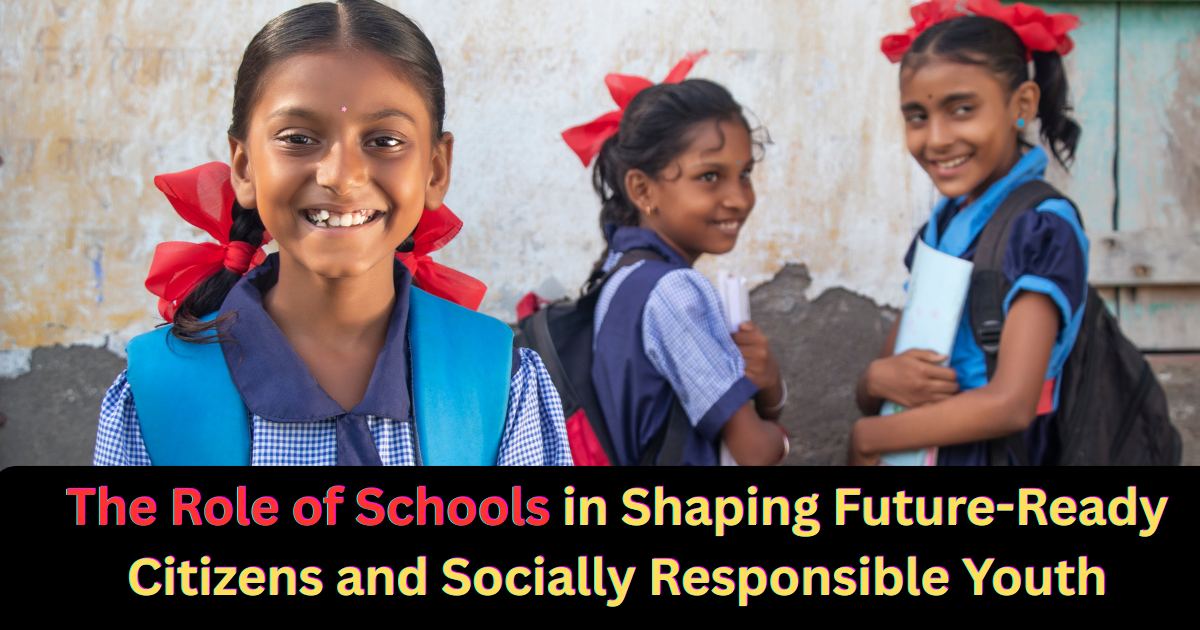The Role of Schools in Shaping Future-Ready Citizens and Socially Responsible Youth: Education shapes our future and is very important in each person’s life. It helps children’s development and contributes to the economic and social development of society. Today, education can be received at home, at school, or within the community. In India, the most common place to acquire knowledge is at schools.
The Role of Schools in Shaping Future-Ready Citizens
The Role of School in Shaping Future Generations Schools play an essential role in society, providing students with education, social skills, and a foundation for future success. They are not only places where children learn academic subjects but also where they acquire the values, skills and knowledge necessary to navigate a complex world.

1. The Academic Foundation
At its core, a school’s primary function is to provide academic education. Schools offer structured curricula that introduce students to essential subjects like mathematics, science, language arts, history, and social studies, learning these subjects to gain foundational knowledge and skills necessary for higher education and professional life.
Schools also help the student develop literacy and numeracy skills, which are critical for nearly every aspect of life. Beyond reading, writing, and arithmetic, students are exposed to analytical skills, problem-solving techniques, and creative thinking.
2. Social and Emotional Development
Schools are also places where children learn to socialise and develop emotionally. Through interactions with peers, teachers, and other school staff, students learn important social skills, teamwork, empathy, and conflict resolution.
Extracurricular activities, such as sports, music, drama, and art, further contribute to students` emotional growth. These activities help students build confidence, manage stress, and develop resilience. Emotional intelligence, which encompasses understanding and managing one’s emotions, is an important life skill that schools actively cultivate.
3. Values and citizenship
Schools also play a significant role in teaching students about values and citizenship. Students are often introduced to principles like honesty, integrity, respect, and responsibility.
Social Responsibility:
Incorporating social responsibility into the educational curriculum encourages students to act with integrity and compassion. Social responsibility fosters a culture of social awareness and civic duty, preparing students to address societal issues, respect diversity, and contribute positively to the communities. Schools can promote social responsibility through curriculum design, extracurricular activities and community-based projects, shaping students’ personal growth and building stronger conscientious communities.
Why should social responsibility be incorporated by schools?
The reasons are:
- It encourages them to consider the impact of their actions on others.
- It instills values such as empathy, integrity, and a sense of community to contribute positivity to society.
- Social responsibility can manifest in different ways, like sustainable practices or community services.
- Incorporating social responsibility instills a mindset of advocacy for fairness, justice and ethical behaviour.
- Through classroom introductions or project work, teachers can encourage critical thinking and promote civic engagement among the students.
How does Education shape a person and Society
- Illuminating Minds with Rationality
Education also boosts reasoning skills, which fight biases and prejudices. This improves rationality by challenging beliefs and encouraging positive changes.
- Promoting Fairness and Justice
Education teaches people the difference between right and wrong. Therefore, they are supposed to be moral and have a sense of right and wrong. This is the way for building a balanced society
- Sparking Innovation and Growth
Education offers new perspectives and tools for life, promoting societal change and creativity. This helps people to be more useful in the advancement of the modern world.
- Enhancing Health and Wellness
An informed citizen is able to make the right lifestyle changes and take better betterdecisions. This goes a long way in ensuring important aspects such as hygiene.
- Fueling Economic Growth
An educated workforce is a key driver of economic growth as individuals become more capable, efficient and diverse. Education increases productivity and is an important component of the long-term growth of an economy.
- Fostering Global Harmony
Education The Indian Council for Cultural Relations and its programmes are an example of how education plays a vital role in fostering relations between nations through cultural exchanges and scholarships.
Conclusion
In this article we discussed the role of Schools in shaping future-ready citizens and socially responsible youth: Education shapes our future and is very important in each person’s life. Schools also help the student develop literacy and numeracy skills, which are critical for nearly every aspect of life.